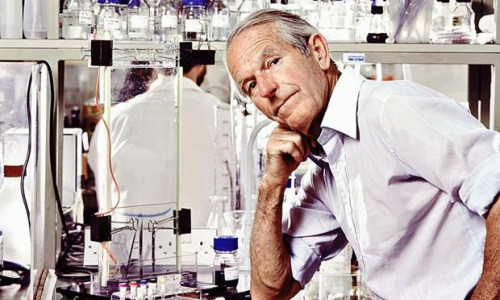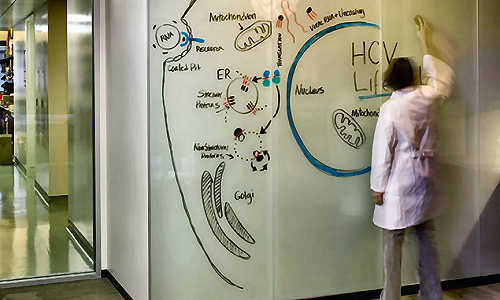Dr. Frederick Sanger, recognized by many as the “father of genomics”, died Tuesday 19 November 2013, at the age of 95. The founding member of the MRC Laboratory of Molecular Biology in Cambridge, and the person after whom the Sanger Institute is named, he was known as an extremely modest and self-effacing man whose innumerable scientific contributions have had an extraordinary impact on molecular biology.
A pioneer of DNA sequencing, he started his scientific career by reading Natural Sciences as an undergraduate at St John’s College, Cambridge. He subsequently undertook a PhD, completed in 1943 with a thesis entitled “The metabolism of the amino acid lysine in the animal body”. After receiving his doctorate he continued to work at the University as a post doctorate, aiming to determine the entire sequence of amino acids in a protein chain.
Dr. Sanger is one of only four double Nobel laureates, and the only person ever to have won both prizes in chemistry. In 1958, he was awarded the Nobel Prize for his research on protein structure and, in particular, the discovery of the structure of insulin. In 1962 he left the University and moved to the new UK Medical Research Council Laboratory of Molecular Biology (LMB) as Head of the Protein and Nucleic Acid Chemistry Division.
Whilst at the LMB, Sanger worked with colleagues in developing methods to sequence the nucleic acids DNA and RNA. His group produced the first complete sequence of a virus genome, of just over 5000 base-pairs; they went on to sequence the first human genome of about 16,000 base-pairs, and in 1982 they sequenced the genome of a virus of around 48,000 base-pairs. This work foreshadowed modern research into the human genome, including that done by the Sanger Institute.
It was this work on DNA that earned Sanger his second Nobel Prize in 1980, received jointly with Paul Berg (Stanford University) and Walter Gilbert (Harvard University), “for their contributions concerning the determination of base sequences in nucleic acids”. His development of the “dideoxy” or “Sanger” technique of sequencing is still used today, and allows 500-800 bases to be read at a time. Three years later, in 1983, Sanger retired.
Venki Ramakrishnan, Deputy Director of the LMB, added “Fred was one of the outstanding scientists of the last century and it is simply impossible to overestimate the impact he has had on modern genetics and molecular biology. Moreover, by his modest manner and his quiet and determined way of carrying out experiments himself right to the end of his career, he was a superb role model and inspiration for young scientists everywhere.”
Richard Henderson, former LMB Director remembers, “He was a superb hands-on scientist with outstanding judgement and skill, and an extremely modest yet encouraging way of interacting with his younger colleagues. I particularly remember one young scientist who had asked Fred for advice being told, ‘I think you should try harder’. The example he set will continue to motivate young scientists even now he has gone.”
Sir Gregory Winter, Master of Trinity College, is a former Head of Division of Protein and Nucleic Acid Chemistry at the LMB – a position which Sanger had also held. He said: “The impact of Fred Sanger’s work in reading the polymers of life has been felt in almost every area of biology and medicine; it is difficult to imagine a world without his contributions. Not only did his work provide deep insights into the chemical nature of life, but it had huge practical implications – it led directly to the sequencing of the human genome and also helped to lay the foundations of the modern biotechnology and pharmaceutical industries.”
Story Source:
The above story is reprinted from materials provided by Scicasts.





